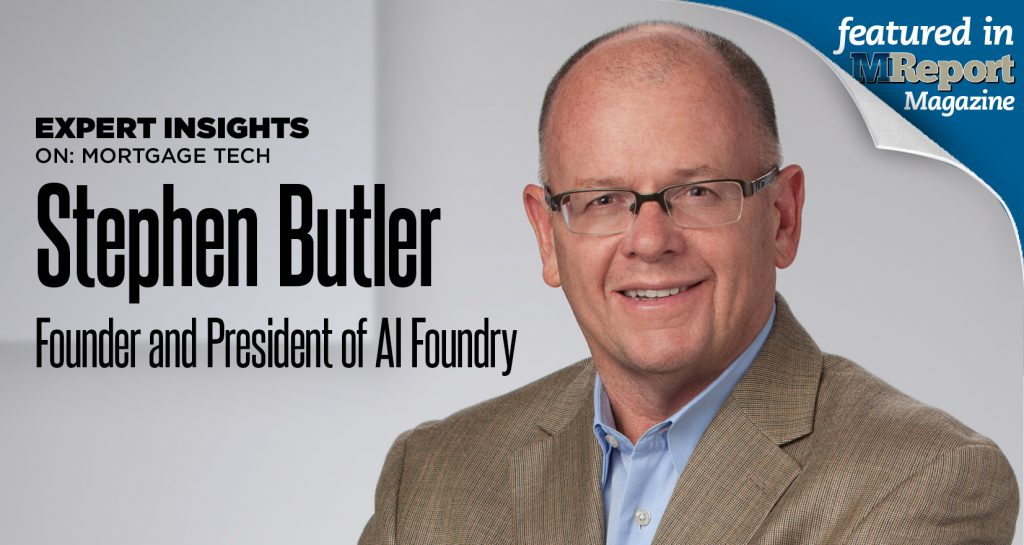
Editor’s note: This feature originally appeared in the January issue [1] of MReport.
AI Foundry automates and streamlines enterprise business operations, as well as creating software solutions that make data actionable. Prior to founding the company, Stephen Butler’s leadership included CEO positions for companies such as Terascala, ManageSoft, and Carbon Design Systems.
Butler recently spoke with MReport about the lessons AI Foundry is taking away from its development of new products, its partnership with Ellie Mae, and how he thinks a new generation of buyers are changing the market.
How are the needs of younger homebuyers driving change in the mortgage industry?
This generation grew up on the Uber experience: this idea that when they’re looking for a service, it’s nearly instantaneous in terms of getting what they want. Certainly, they have lots of transparency built into the service. This old way of thinking, where you throw stuff over the wall and hear about it through a phone call or an email down the road, that just isn’t going to work. It’s got to be very interactive. That’s the other thing that the millennials have become comfortable with—everything is interactive and transparent.
They’re driving technology changes, and they’re shifting and looking for providers that can offer that experience. It’s the idea that you could go home at night at 9:00 p.m. or whenever you want to do it, upload your documents, and almost instantly be told, “you’re missing this document,” or your social security number is not consistent across all the documents, or the data that you put on your application doesn’t match the income data or the asset data you put on the documents.
Today, that’s a multiweek process that we could deliver within an hour through technology. That’s the experience that the millennials want, and what the future is all about for the mortgage industry, and pretty much any industry. They’re driving a lot of technological changes on the customer-experience side
Why has the mortgage industry been slow to keep up with technological advancements?
I think the complexity involved is significant. It’s a very analog process. By that I mean, everything is paper-driven and rich in documents—there’s a document for everything. There are thousands of documents. As a result, anytime you introduce that amount of paper, you’ve introduced a lot of labor. It’s hard to mechanize it. You have to turn it into a robotic process.
Part of it is that you had the Sarbanes-Oxley wave of regulations in the early 2000s, and then you had the next round of regulations that came in 2008 and 2009 due to the issues with the subprime market. It’s a regulation-driven industry, which has created a lot of the complexity in documents, and that’s why it is. Banks and mortgage companies, who have to be somewhat conservative, have been reluctant or have found it difficult to sort of take a process that works. It’s expensive.
We recently debuted our Agile Mortgages solution, which is a platform for automating the mortgage process from end-to-end. Meaning right from the beginning at the origination, through underwriting, close, and post-close, and even into the secondary market, the platform integrates a number of AI technologies that we’ve developed, including computer vision, machine learning, and robotic processing. It integrates it into a platform to accomplish that level of automation.
AI Foundry is comprised of data scientists, mortgage professionals, and enterprise software people. We started four years ago wanting to take business-process automation to a new level and to start automating things that, up to now, have not been able to be automated because of the amount of complexity.
We did some research in the marketplace, started to talk to banks and mortgage companies, and realized that the back office of the typical mortgage-processing operation is heavily labor-intensive. In fact, the industry employs a large labor pool to manage the documents and execute the business rules for quality and compliance based on the data on those documents. In those discussions, we thought, “If we could pull together a totally AI-based platform, we could start to chip away at this high cost of labor.” That’s kind of how we proceeded, and with lots of collaboration with customers, including large mortgage companies, we’ve been able to build a solution that they need.
What insights has AI Foundry taken away from its partnership with Ellie Mae?
Ellie Mae is a prominent leading supplier of the loan origination system, which is the system of record for mortgage loans. The majority of the market is putting data into Ellie Mae’s solution, called Encompass, and then taking data out that needs to be processed for providing quality and compliance testing. It’s a labor-intensive process to put data in and take data out, so we’re automating that. Think of us as an on-ramp to the Encompass solution. Our ability to automate all the information off of documents, and the documents themselves, and put them in the right places.
Do you foresee more of this technology becoming common in the industry?
Yes, definitely. The new category of technology-powered lenders are driving their internal costs lower and their loan turnaround times shorter, making them more competitive against the traditional lenders who are seeing costs continue to grow to $4,000 per loan and higher because of their lack of commitment to technology.
The industry itself has to invest in automation, but the buyers also, the applicants, are demanding it. A greater percentage of homebuyers are millennials, and they are looking for an improved process. The idea of supplying documents and waiting a couple of weeks to find out whether or not they supplied all the documents the bank needs and whether or not those documents are correct and support their application…they don’t want to wait two weeks. They want to know within 24 hours, and maybe even within an hour. You’re only going to do that with AI and with automation.